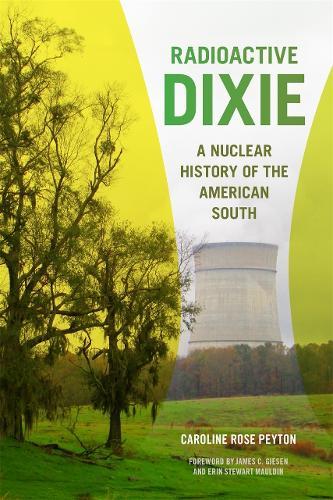Overview
How and why did the South’s history, culture, and politics shape the region’s nuclear and energy industries? And how is that history linked to broader developments in the nuclear and energy industries—nationally and globally? Radioactive Dixie answers those questions as it traces the origins of the U.S. South’s love affair with the atom. The South contains more nuclear reactors than any other region in the United States and much of the nation’s radioactive waste. This book shows how the South’s atomic footprint resulted from a decades-long effort by southern politicians, industry figures, universities, and government officials to transform the American South into a nuclear-oriented region. Waving the atomic talisman, the nuclear industry served as one pivotal part in a larger project of regional modernization—a process that began in the nineteenth century and lasted more than a century. From this perspective, bomb plants and nuclear reactors promised to expand the South’s economy and to cast its identity as a center of modern industry, science, and engineering and as a producer of cheap, limitless energy. Radioactive Dixie is the first book to chronicle this regional story that had national implications. Southern history informed national siting decisions, regulatory oversight, and attitudes toward the various nuclear projects that proliferated in the post–World War II period.
Full Product Details
Author: Caroline Peyton ,
James C. Giesen ,
Erin Stewart Mauldin
Publisher: University of Georgia Press
Imprint: University of Georgia Press
ISBN: 9780820373966
ISBN 10: 0820373966
Pages: 276
Publication Date: 01 December 2025
Audience:
College/higher education
,
Postgraduate, Research & Scholarly
Format: Hardback
Publisher's Status: Forthcoming
Availability: Not yet available

This item is yet to be released. You can pre-order this item and we will dispatch it to you upon its release.
Reviews
Radioactive Dixie is a dynamic, engaging, and very needed addition to the field of energy history that shows how communities and environments in the American south were integral to the strange story of mid century nuclear research and development. -- Sarah Stanford-McIntyre * author of Natural Risk: An Environmental History of West Texas Oil and the Rise of Sunbelt Texas * Caroline Peyton’s cogent, deeply-researched narrative shows us how closely the political and economic ambitions of the postwar U.S. South were tied to the atom and its promises of growth, abundance, and prosperity. -- Jacob Darwin Hamblin * author of The Wretched Atom: America’s Global Gamble with Peaceful Nuclear Technology *
Radioactive Dixie is a dynamic, engaging, and very needed addition to the field of energy history that shows how communities and environments in the American south were integral to the strange story of mid century nuclear research and development. -- Sarah Stanford-Mcintyre * author of Natural Risk: An Environmental History of West Texas Oil and the Rise of Sunbelt Texas *
Author Information
CAROLINE ROSE PEYTON is a historian of the American South, whose research specializes in the intersection of environment, technology, and society. In 2017, she was awarded the American Society for Environmental History’s Alice Hamilton Prize for the best article published outside Environmental History and the Southern Historical Association’s Jack Temple Kirby Prize for “Kentucky’s ‘Atomic Graveyard’: Maxey Flats and Environmental Inequity in Rural America,” published in the Register of the Kentucky Historical Society.



